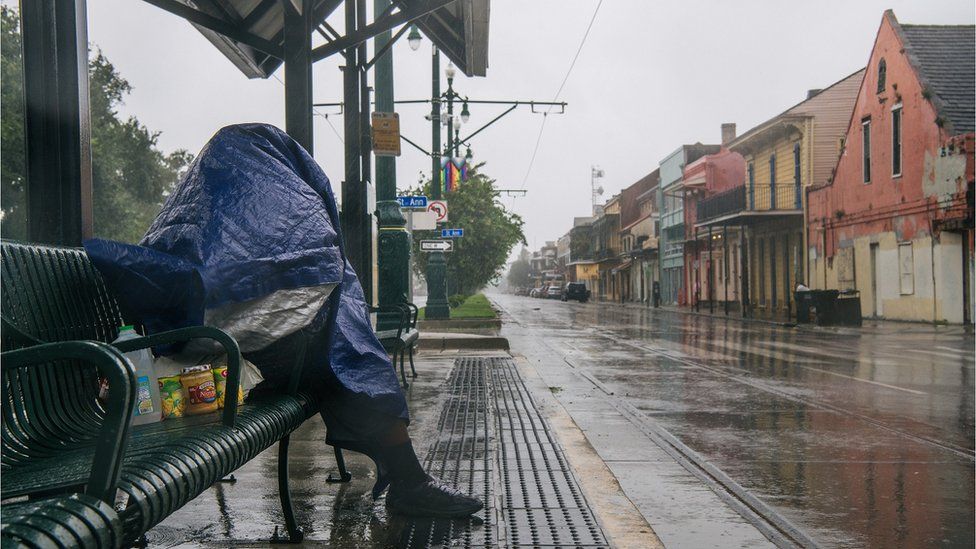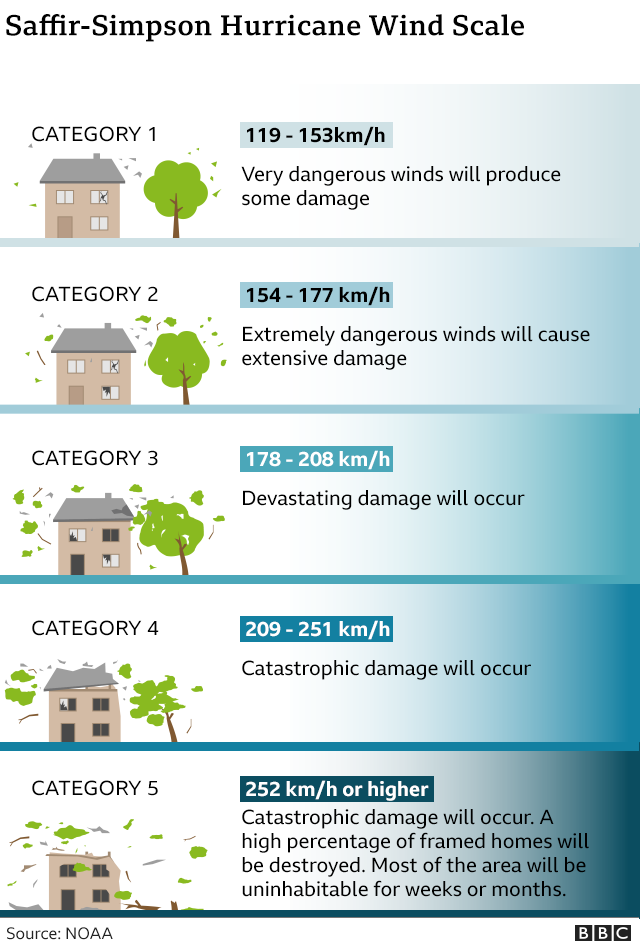Hurricane Ida has made landfall in the US state of Louisiana, with winds of 150mph (240km/h) and a potentially "catastrophic" storm surge, the National Hurricane Center (NHC) says.
Thousands of people have fled. Those who stayed have been advised to shelter in place until the storm passes.
Ida will test the flood defences - known as levees - of New Orleans, which were strengthened after Hurricane Katrina killed 1,800 people in 2005.
So far, the levees are holding.
President Joe Biden said Ida would be "life-threatening", with immense devastation likely beyond the coasts.
Already, more than 300,000 households in Louisiana are without power. Mr Biden warned it could take weeks to restore supplies.
Ida gathered strength over the warm waters of the Gulf of Mexico during the weekend.
It made landfall near Port Fourchon, south of New Orleans, as a category four hurricane on the five-step Saffir-Simpson scale - meaning it will cause severe damage to buildings, trees and power lines.
In some places the storm surge could be as high as 16ft (4.8m), potentially submerging parts of the low-lying coastline.
It came ashore on the 16th anniversary of Katrina, a category three storm.
"There is no doubt that the coming days and weeks are going to be extremely difficult for our state and many, many people are going to be tested in ways that we can only imagine today. But I can also tell you that as a state we've never been more prepared," state Governor John Bel Edwards said.
Video from NBC television news showed high winds tearing the roof off a hospital in the town of Cut Off, Louisiana, just inland from the Gulf of Mexico.

The impact of climate change on the frequency of storms is still unclear, but increased sea surface temperatures warm the air above, making more energy available to drive hurricanes.
As a result, they are likely to be more intense with more extreme rainfall.
New Orleans resident Tanya Gulliver Garcia, who works for the Center of Disaster Philanthropy, told the BBC she was staying put.
"I'm fairly worried - more than I thought I would be. I've volunteered in disasters for a number of years... but it's different when it's in your own home, instead of a nice, safe, sheltered place," she said.
In a tweet, the US National Weather Service (NWS) told New Orleans residents: "Go to an interior room or a small room with no windows. Stay put during this time."
Louisiana hospitals are already under pressure from Covid-19. The state has the third-highest rate of infections in the US.
Normally, hospitals in the predicted path of the hurricane would be evacuated, but this time there are few beds available, even at facilities further inland.
"We don't have any place to bring those patients. Not in state, not out of state," Mr Edwards said.
More than 90% of oil production in the Gulf of Mexico has been shut down.



How has hurricane Ida affected you? Only if it's safe to do so, you can get in touch by emailing haveyoursay@bbc.co.uk.
Please include a contact number if you are willing to speak to a BBC journalist. You can also get in touch in the following ways:
- WhatsApp: +44 7756 165803
- Tweet: @BBC_HaveYourSay
- Upload pictures or video
- Please read our terms & conditions and privacy policy
If you are reading this page and can't see the form you will need to visit the mobile version of the BBC website to submit your question or comment or you can email us at HaveYourSay@bbc.co.uk. Please include your name, age and location with any submission.
https://news.google.com/__i/rss/rd/articles/CBMiM2h0dHBzOi8vd3d3LmJiYy5jby51ay9uZXdzL3dvcmxkLXVzLWNhbmFkYS01ODM3ODc4ONIBAA?oc=5
2021-08-29 20:20:45Z
52781846351688
Tidak ada komentar:
Posting Komentar